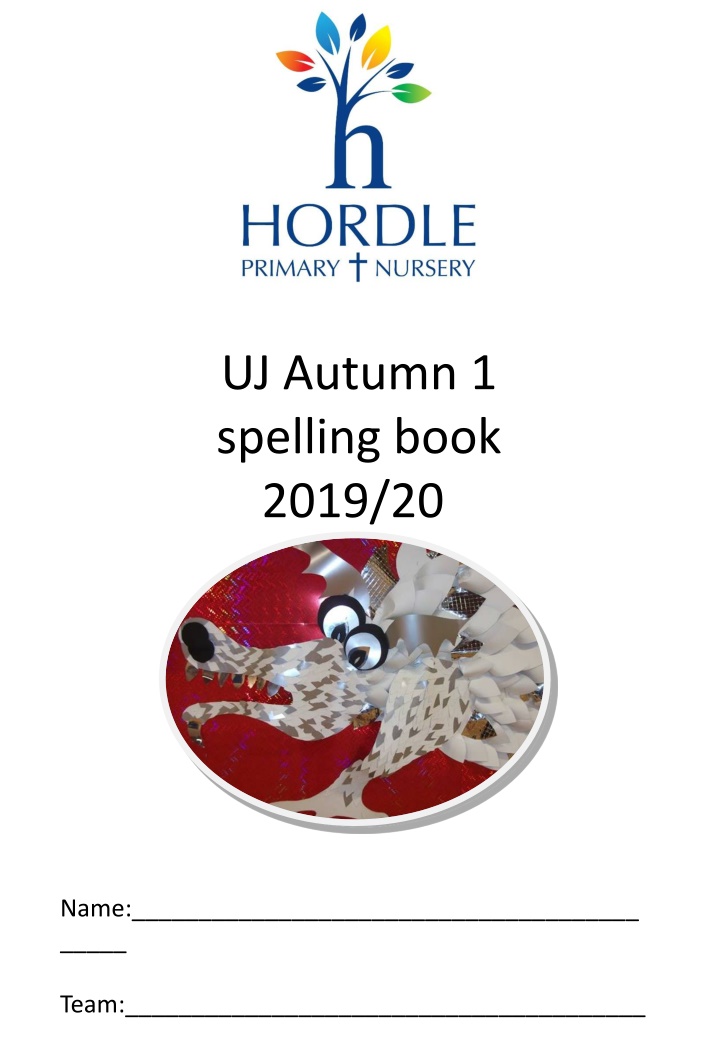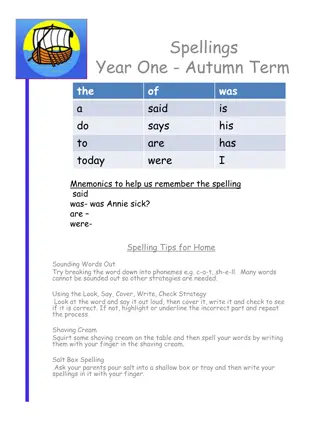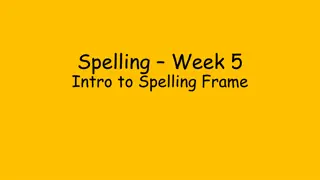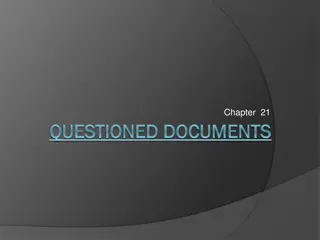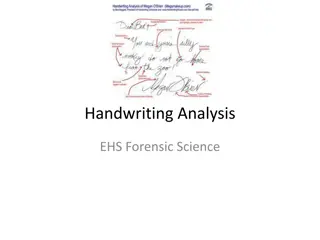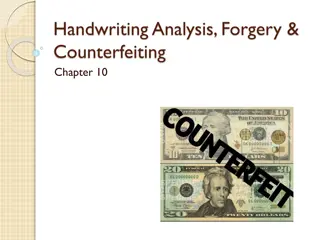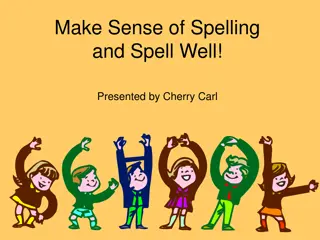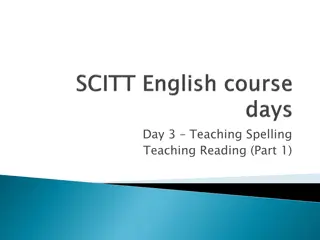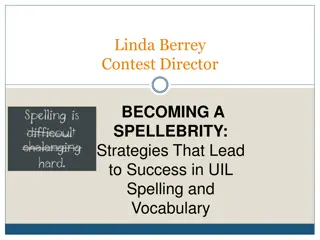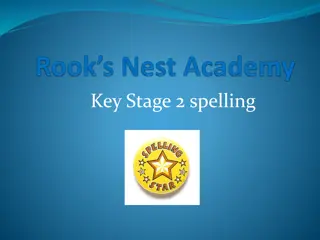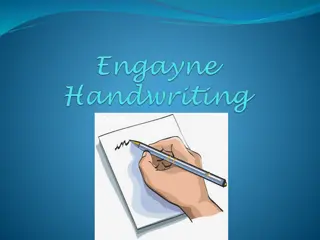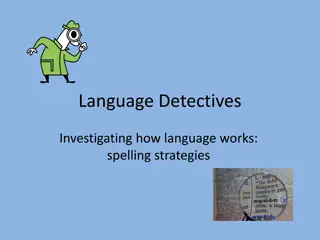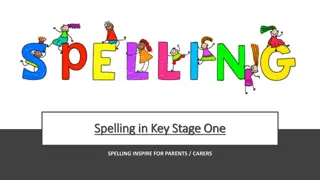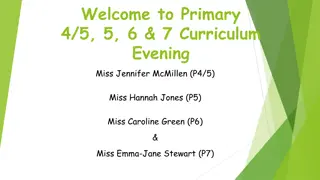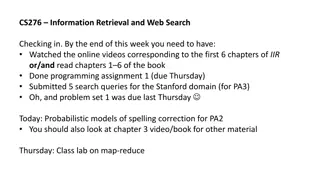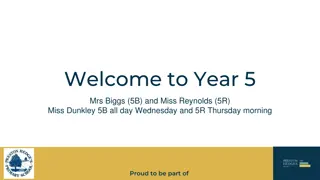Spelling and Handwriting Practice for Upper Juniors
Develop your spelling skills through practice with homophones, spelling rules, and Y5/6 word list words. Enhance joined writing techniques with effective strategies like air-writing and the Quadrant Method. Stay engaged with various activities like writing in alphabetical order, using words in sentences, and playing spelling games.
Download Presentation

Please find below an Image/Link to download the presentation.
The content on the website is provided AS IS for your information and personal use only. It may not be sold, licensed, or shared on other websites without obtaining consent from the author.If you encounter any issues during the download, it is possible that the publisher has removed the file from their server.
You are allowed to download the files provided on this website for personal or commercial use, subject to the condition that they are used lawfully. All files are the property of their respective owners.
The content on the website is provided AS IS for your information and personal use only. It may not be sold, licensed, or shared on other websites without obtaining consent from the author.
E N D
Presentation Transcript
UJ Autumn 1 spelling book 2019/20 Name:______________________________________ _____ Team:_______________________________________ _____
Word List Book Upper Juniors Whilst we are continuing our hard work on spelling patterns and rules in school, you are expected to practise these at home. Each week, you will be given three different sets of words: Homophones: two words which sound the same but have different meanings and different spellings. Spelling Rule words: based on spelling patterns which are being taught in SPAG that week. Y5/6 Word List Words: words which are noted in the National Curriculum for children to be able to spell at the end of Y5/6. These can be found within this spelling booklet. You will be tested on these spellings weekly. Happy Spelling!
Handwriting The importance of joined writing is key when learning how to spell. Try air-writing your spellings or using a chalkboard. Air writing will help you to learn the movements required to form the letters within the word. Quadrant Method Fold a piece of paper into 4 quadrants: Quadrant 1: write out word 5 times, saying the letters each time in your handwriting, looking at the word, if necessary. Quadrant 2: write out word 5 times, saying the letters in handwriting. Quadrant 3: write out word 5 times, saying the letters with eyes closed. Quadrant 4: write out word 5 times in silence from memory. Did you get it right? You could also try: Writing your spellings in alphabetical order. Using them within a sentence (this checks you know the meaning too!) Using different coloured pens for the different sounds or syllables. Using magazine cuttings and finding the letters to make the word. Playing a spelling game like Hangman with a friend or family member. Making a spelling poster. Creating your own spelling game, using your word list for the week, for example: SNAP!
Week 1 Rule of the week: long and short vowel sounds Homophone: there, their, they re Spelling rule: The ed suffix RULE ONE:If a regular verb already ends with an e just add d . bake baked hope hoped whine whined RULE TWO:If the present tense verb ends in consonant and a y , the y becomes an I and then add ed . hurry hurried worry worried HOWEVER, don t change the y to an i if it ends with a vowel and then the y (stay stayed). RULE THREE: If a regular verb with ONE syllable ends with one vowel and a consonant, double the consonant and add ed . wrap wrapped beg begged step stepped RULE FOUR: If a regular verb with MORE THAN ONE SYLLABLE ends with a vowel and a consonant and the last syllable is stressed, double the consonant and add ed . prefer preferred admit admitted RULE FIVE: When a verb ends with vowel and c. mimic -
Practise Look, say, cover, spell, check. Homophone there their they re worried whined stepped admitted mimicked Spelling rule YR 5/6 word list accommodate accompany according Can you write the words in a sentence?
Week 2 Rule of the week: long and short vowel sounds Homophone: two, to, too Spelling rule: The ed suffix RULE ONE:If a regular verb already ends with an e just add d . bake baked hope hoped whine whined RULE TWO:If the present tense verb ends in consonant and a y , the y becomes an I and then add ed . hurry hurried worry worried HOWEVER, don t change the y to an i if it ends with a vowel and then the y (stay stayed). RULE THREE: If a regular verb with ONE syllable ends with one vowel and a consonant, double the consonant and add ed . wrap wrapped beg begged step stepped RULE FOUR: If a regular verb with MORE THAN ONE SYLLABLE ends with a vowel and a consonant and the last syllable is stressed, double the consonant and add ed . prefer preferred admit admitted RULE FIVE: When a verb ends with vowel and c. mimic -
Practise Look, say, cover, spell, check. Homophone two to too baked preferred controlled regretted profited Spelling rule YR 5/6 word list achieve aggressive amateur Can you write the words in a sentence?
Week 3 Rule of the week: ie , i_e Homophone: two, to, too Spelling rule: The ed suffix RULE ONE:If a regular verb already ends with an e just add d . bake baked hope hoped whine whined RULE TWO:If the present tense verb ends in consonant and a y , the y becomes an I and then add ed . hurry hurried worry worried HOWEVER, don t change the y to an i if it ends with a vowel and then the y (stay stayed). RULE THREE: If a regular verb with ONE syllable ends with one vowel and a consonant, double the consonant and add ed . wrap wrapped beg begged step stepped RULE FOUR: If a regular verb with MORE THAN ONE SYLLABLE ends with a vowel and a consonant and the last syllable is stressed, double the consonant and add ed . prefer preferred admit admitted RULE FIVE: When a verb ends with vowel and c. mimic -
Practise Look, say, cover, spell, check. Homophone two to too clicked tapped wiped striped stroked Spelling rule YR 5/6 word list ancient apparent appreciate Can you write the words in a sentence?
Week 4 Rule of the week: ee, ea, e_e Ee : Use ee in the middle and sometimes at the end. green, screech, bleed, sheek, seed Ea : The next most common spelling. each, peach, leaf, leave, leak, reach e_e: A few words have e_e. Often these have two syllables. concede, gene, concrete, sincere Y: When the ee sound is at the end, it s often spelt with a y memory, party Homophone: Your, you re Spelling rule: The ing suffix Rule 1 If the vowel is a short sound If the vowel is a short sound with only one consonant after it, then you must double the consonant. Lap = lapping Put = putting Rule 2 If the vowel is a short sound, but has more than one consonant after it then just add ing. Back = backing Stick = sticking Rule 3 If it ends in e drop the e when adding ing Come = coming Hope = hoping
Practise Look, say, cover, spell, check. Homophone your you re begging nodding standing joking taking Spelling rule YR 5/6 word list attached available average Can you write the words in a sentence?
Week 5 Rule of the week: ee, ea, e_e Ee : Use ee in the middle and sometimes at the end. green, screech, bleed, sheek, seed Ea : The next most common spelling. each, peach, leaf, leave, leak, reach e_e: A few words have e_e. Often these have two syllables. concede, gene, concrete, sincere Y: When the ee sound is at the end, it s often spelt with a y memory, party Homophone: Effect, affect Spelling rule: The dis- un- and im- prefix ( a group of letters that go at the front of a word and change the meaning) Remember, they get fixed to a root word. Im is not a prefix in important because portant isn t a root word. Don t get them confused with words which just start with those letters! Dis- The prefix dis also means not and opposite of. For example, disconnect. Un- The prefix un means not, reverse action, deprive of, release from. For example, unable or unfair. Im- The prefix im can also mean not and opposite of. For example, impossible, disadvantage disappear disallow disobey uninterested unwell unhappy improbable impolite imbalance
Practise Look, say, cover, spell, check. Homophone effect affect disadvantage impatient uninterested unwell disobey Spelling rule YR 5/6 word list awkward bargain bruise Can you write the words in a sentence?
Week 6 Rule of the week: ue, u_e, ew Homophone: Effect, affect Synonyms and antonyms Synonym = a word or phrase that means exactly or nearly the same as another word or phrase in the same language, for example shut is a synonym of close. Antonym = a word opposite in meaning to another (e.g. bad and good ).
Practise Look, say, cover, spell, check. Homophone affect effect suite glue knew screw flew fuse Spelling rule YR 5/6 word list category cemetery committee Can you write the words in a sentence?
UJ Autumn 2 spelling book 2019/20 Name:______________________________________ _____ Team:_______________________________________ _____
Word List Book Upper Juniors Whilst we are continuing our hard work on spelling patterns and rules in school, you are expected to practise these at home. Each week, you will be given three different sets of words: Homophones: two words which sound the same but have different meanings and different spellings. Spelling Rule words: based on spelling patterns which are being taught in SPAG that week. Y5/6 Word List Words: words which are noted in the National Curriculum for children to be able to spell at the end of Y5/6. These can be found within this spelling booklet. You will be tested on these spellings weekly. Happy Spelling!
Handwriting The importance of joined writing is key when learning how to spell. Try air-writing your spellings or using a chalkboard. Air writing will help you to learn the movements required to form the letters within the word. Quadrant Method Fold a piece of paper into 4 quadrants: Quadrant 1: write out word 5 times, saying the letters each time in your handwriting, looking at the word, if necessary. Quadrant 2: write out word 5 times, saying the letters in handwriting. Quadrant 3: write out word 5 times, saying the letters with eyes closed. Quadrant 4: write out word 5 times in silence from memory. Did you get it right? You could also try: Writing your spellings in alphabetical order. Using them within a sentence (this checks you know the meaning too!) Using different coloured pens for the different sounds or syllables. Using magazine cuttings and finding the letters to make the word. Playing a spelling game like Hangman with a friend or family member. Making a spelling poster. Creating your own spelling game, using your word list for the week, for example: SNAP!
Week 1 Rule of the week: stressed and unstressed vowels Words contain vowels. Some are easy to hear (stressed). Some are not easy to hear (unstressed). Words that have an unstressed vowel are words which you can t hear the vowel unless you say the word differently. For example general (you can t hear the second e). Homophone: Aisle isle Spelling rule: The ate suffix Often ate is added to the end of the word to make an adjective which possesses a certain characteristic. For example, fortunate means someone with good fortune. However, there are lots of words which just contain ate at the end. Nouns Adjectives Verbs illiterate considerate deliberate adequate fortunate certificate chocolate estimate moderate evaluate irritate approximate
Practise Look, say, cover, spell, check. Homophone aisle isle through considerate tough dough moderate Spelling rule YR 5/6 word list communicate community competition Can you write the words in a sentence?
Week 2 Verb tense consistency refers to keeping the same tense throughout a clause. We don't want to have one time period being described in two different tenses. If you have two or more time periods, start a new clause or a new sentence. Rule of the week: Verb tense consistency Homophone: allowed, aloud Spelling rule: The ise suffix -ise is added to words to make a verb form. For example, liquidise is when a liquid is made. Fossilise is when a fossil is made. Advert = advertise Apology = apologise Computer = computerise Modern = modernise
Practise Look, say, cover, spell, check. Homophone allowed aloud advertise materialise personalise summarise individualise Spelling rule YR 5/6 word list conscience conscious controversy Can you write the words in a sentence?
Week 3 Rule of the week: simple, compound and complex sentences Homophone: Cereal, serial Spelling rule: The ify suffix -ify is added to some adjectives and nouns to make verbs meaning to become or to make someone or something become something . Class = classify Pure = purify Simple = simplify Glory = glorify
Practise Look, say, cover, spell, check. Homophone serial cereal dignify magnify identify specify satisfy Spelling rule YR 5/6 word list convenience correspond criticise Can you write the words in a sentence?
Week 4 Rule of the week: subordinating and coordinating conjunctions Homophone: Complement, compliment Spelling rule: The comm- prefix Rule 1 If the vowel is a short sound If the vowel is a short sound with only one consonant after it, then you must double the consonant. Lap = lapping Put = putting Rule 2 If the vowel is a short sound, but has more than one consonant after it then just add ing. Back = backing Stick = sticking Rule 3 If it ends in e drop the e when adding ing Come = coming Hope = hoping
Practise Look, say, cover, spell, check. Homophone complement compliment communicate community command committees Spelling rule YR 5/6 word list curiosity definite desperate Can you write the words in a sentence?
Week 5 Rule of the week: modal verbs Homophone: Descent, dissent Spelling rule: The sion, -ssion, -tion, - cian, -tious, -cious suffix
Practise Look, say, cover, spell, check. Homophone dissent descent nutrition gracious session electrician compulsion Spelling rule YR 5/6 word list determined develop dictionary Can you write the words in a sentence?
Week 6 Rule of the week: -cial and tial Most commonly, use cial after a vowel and tial after a consonant. Homophone: Desert, dessert Spelling rule The un-, dis-, mis- and im- prefix All of these have negative meanings. Un- = the opposite meaning (undo) Mis- = do something by accident (miscommunicate) Dis- = the opposite meaning (disappear) Im- = added to words that begin with m, b or p (immature)
Practise Look, say, cover, spell, check. Homophone desert dessert misjudge disconnect artificial torrential confidential Spelling rule YR 5/6 word list disastrous embarrass environment Can you write the words in a sentence?
